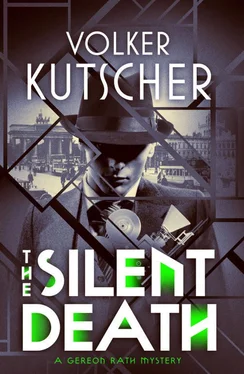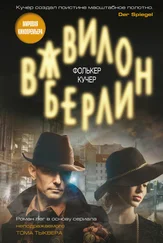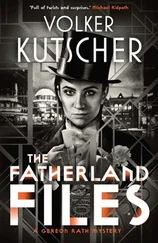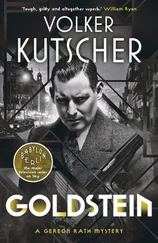A trick wasn’t how Bellmann saw it. He had calmed down by the time he re-entered the office, but wasn’t about to retract his accusations. At least his suspicions could now be substantiated. He claimed that La Belle had frequently had trouble with Montana, with some disputes even going to court. Plagiarism was the least of it; it was a question of poaching artists, sabotaging premieres and all kinds of other dirty tricks. Similar accusations, ‘all of them rather far-fetched’, as the producer would have it, had also been made against Bellmann by Montana, resulting in the La Belle owner being ‘hauled in front of a judge’ on several occasions. A long list, therefore, to which could now be added sabotage of filming and the murder of the incensed Heinrich Bellmann’s most important actress.
Murder as the ultimate means of sabotage seemed unlikely to Rath, but he could understand the film producer’s rage. There had to be a reason why Krempin had signed on at La Belle under a false name.
Rath was deathly tired but his hunter’s instinct had been wakened. He would sound Montana out first thing tomorrow before Böhm could call him off.
The search for Krempin had already begun by the time Rath returned to Homicide, though Brenner and Lange had since departed. Instead there was a fat man sitting at the desk, engrossed in the files.
‘Superintendent Gennat!’
The fat man looked up. ‘Rath! What are you still doing here? Don’t get your hopes up! You’re not getting my bed. I need it myself!’
Buddha kept a bed in the box room next to his office, which in truth was more like a living room.
‘Nice to see you again, Sir,’ Rath said. ‘Just back from Düsseldorf?’
Gennat nodded. ‘Somehow the way from the station always leads straight to Alex. Funny, isn’t it? I should have got married, then this wouldn’t happen.’
‘Perhaps it would. Are you making any progress?’
‘Don’t ask! You wouldn’t believe how much information we’ve gathered, or how many tip-offs we’ve received from the Düsseldorf public. We now have a pretty clear idea how each murder was committed, but even that hasn’t brought us any closer.’
Gennat took a B.Z. from his leather bag and unfolded the paper. ‘I see you’ve been busy too,’ he said and placed the newspaper on the table in front of Rath. ‘I bought it in the station just now. Can you explain this to me?’
Rath stared at the paper. A special edition of B.Z. am Mittag with a headline in bold on the front page.
Death in film studio! Betty Winter struck dead by spotlight! Sabotage?
Alongside the story were two photos, a perfect portrait of Betty Winter and a slightly blurred image which showed Gereon Rath against the backdrop of a film studio. In the background you could even make out part of the covered corpse – assuming you knew it was there in the first place.
‘There isn’t much to explain,’ he said. ‘An actress died and her producer wanted to make the headlines. The body wasn’t even cold before he called a press conference.’
‘And you helped him. Or is there some other reason you’re quoted here?’
‘The pack had already smelt blood. I had all journalists removed from the crime scene immediately, but the police can’t prevent anyone from holding a press conference. Detective Gräf and I took part to maintain control, and to ensure speculation didn’t run wild.’
‘Well, you did a great job, I must say.’
Rath skimmed the text and saw that Bellmann’s sabotage theory had been reported at length, yet he had said nothing about it at the press conference. Clearly the journalist was aware of the running battle with Montana – even if there was no mention of the studio by name. Rath swallowed hard when he realised that his own pronouncements had been so skilfully woven into the text that it appeared as if police officially supported the sabotage theory.
‘I didn’t authorise any of this,’ he said.
Gennat nodded. ‘That’s OK, Rath, no one’s saying you did. You have to be damn careful when dealing with the big city press. Their reporters can be very useful, but don’t harbour any illusions about keeping them under control.’
‘I’d be happy just to keep them off my back.’
‘Don’t take it so hard,’ Gennat said. ‘Tell me in your own words what happened in that film studio. Betty Winter isn’t just anybody, you know. Böhm only jotted something down about a fatal accident he’d entrusted to you.’
Rath gave a concise report, right up to the bogus lighting technician. ‘The false name, allied to his flight, makes the man highly suspicious,’ he said. ‘In the meantime everything points to sabotage. Perhaps Betty Winter wasn’t meant to die, but it looks as if someone intended to cause her serious harm, and whoever it was, they were at least willing to entertain the possibility of her death. Right now it looks as if Felix Krempin is our man.’
Gennat nodded. ‘Highly plausible, but be sure you don’t draw any hasty conclusions. You’ve come a cropper like that before.’
‘Mistakes are there to be learned from, Sir.’
‘Where did you get that from? Is that what they teach you at police academy these days?’
‘My father, Sir.’
‘A shrewd man, your father. Policeman, isn’t he?’
Rath nodded. ‘Police director.’
‘Then heed his advice and don’t give too much away to the press. Better to share your knowledge with us at A Division.’
Gennat gazed at him sternly. Rath knew that Buddha respected him, but that he had no truck with high-handedness.
‘How long are you staying in Berlin, Sir?’
‘Until Wednesday. Düsseldorf is unbearable at the moment anyway. Carnival. Zörgiebel might see the attraction in cheering Helau , but it’s not my thing at all.’
‘The commissioner is from Mainz,’ Rath said.
‘And you? You’re a Rhinelander too, aren’t you?’
‘Cologner,’ Rath said. ‘We say Alaaf instead of Helau , but I’m more than happy to do without all the fuss this year. It’s more civilised in these parts.’
‘There are plenty of Fasching balls in Berlin this weekend, if you should feel homesick.’
The telephone rang and, before Rath could respond, Gennat picked up.
‘Yes,’ Buddha nodded. ‘Inspector Rath is still here. Just a moment.’ He handed him the receiver. ‘The search unit,’ he said. ‘It looks as if your suspect really has gone to ground.’
Saturday 1st March 1930
Deathly tired, Rath finally dragged himself up the stairs at Luisenufer. With Gennat’s blessing he had intensified the search for the fugitive Krempin and, tomorrow, every police station in Berlin would receive a picture of the man. ED were still in the lab, duplicating a cutting of Bellmann’s Christmas party photo. Felix Krempin had disappeared. Whatever motive there might have been to drop a heavy spotlight on a dainty actress, the production manager clearly had it.
In this light, Bellmann’s suspicions were plausible, even if his priority was most likely making trouble for Montana Film. Rath glanced at the time: half past twelve. He wouldn’t get much sleep now, as he wanted to be at Montana as early as possible tomorrow, ready for action. His keys were in his hand when he remembered that Kathi would be waiting for him.
Suddenly time was frozen.
He couldn’t get into bed as if nothing had happened. For a moment he considered turning on his heel, driving out to Schlesisches Tor and spending the night on Gräf’s sofa. Instead he cursed his own cowardice and turned the key in the lock, surprised at how loud it was. He pulled the door quietly shut and crept through the hall without turning on the light. Closing the living room door behind him, he groped towards the chair, reaching for the switch on the standard lamp. One click and it cast its dim light around the room. He laid his hat and coat over the second chair. She had cleared away the glasses, but the bottle of cognac was still on the table. Rath fetched a new glass from the cupboard, sat in his chair and poured.
Читать дальше












